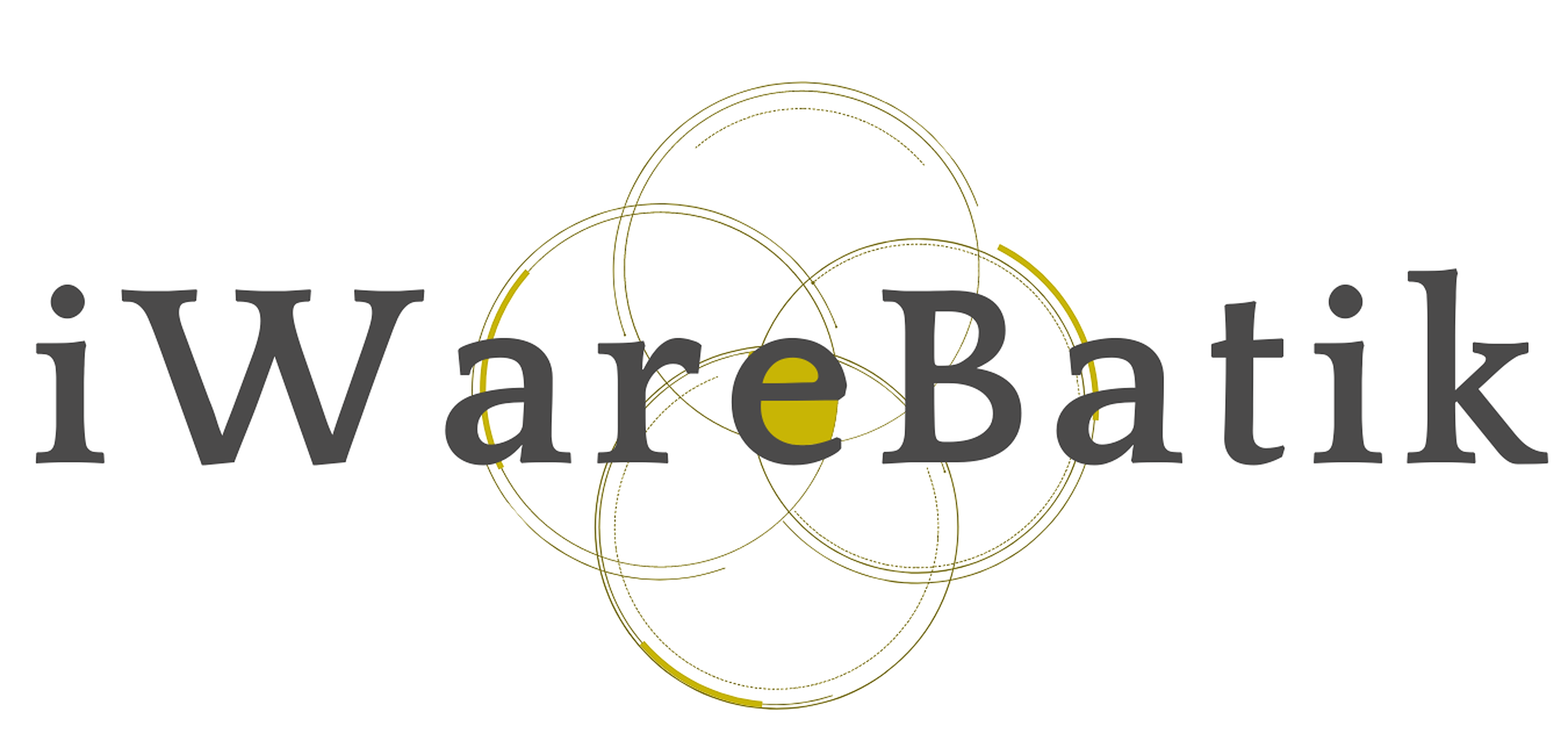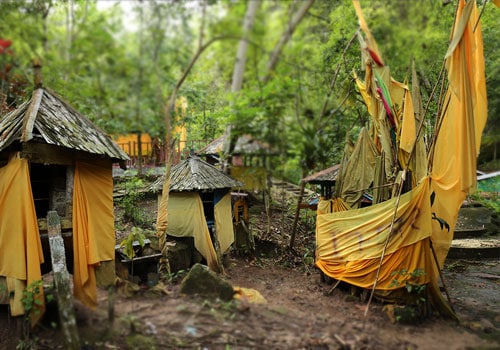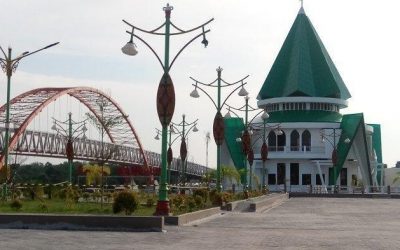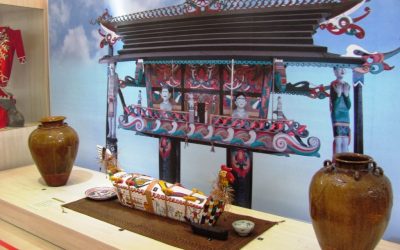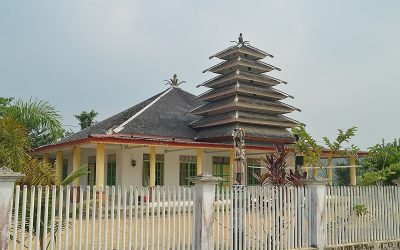Home / Batik Regions – Central Indonesia – Kalimantan Island – Central Kalimantan / Tajahan Tjilik Riwut
Cultural Destination
Embrace the spirit of the place!
Tajahan Tjilik Riwut
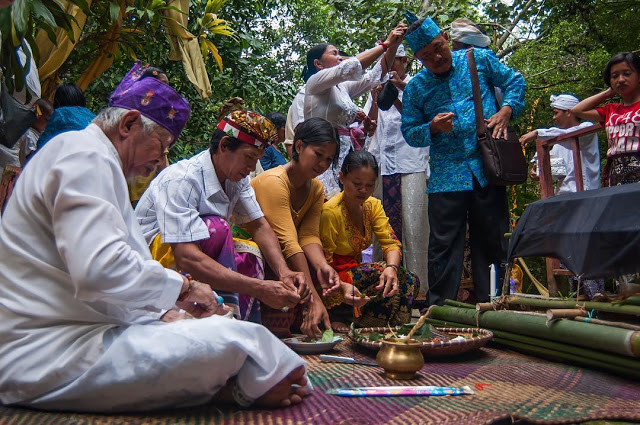
Dayak Ngaju Ritual Ceremony in Tajahan (photo: Debu Yandie)
The sacred place in Tajahan (photo: Indonesian Tourism)
Tajahan Tjilik Riwut
The Dayak Tribe considers it to be a very sacred spot. According to their belief, whenever one has a desire that they must achieve no matter what, they would place yellow cloths and offerings in Tajahan. This place is also used by local Dayak people to talk with the spirit of their dead friends or family members. Rituals are conducted in Tajahan to honour the spirit of the ancestors, as well as to eradicate evil spirits and sweep out bad luck from the community.
Cultural Tourism Destination
Tajahan Tjilik Riwut
Tourist Attractions in Central Kalimantan
Palangkaraya City
Palangkaraya city is another unique destination you cannot miss in West Kalimantan. This modern and vibrant city also
Balanga Museum
Originally thought of as a regional museum, Balanga Museum collects a lot of objects which are
Muara Teweh City
Also known as the “water town”, Muara Teweh is the capital of Barito Utara regency. The strangest thing anyone can
Central Kalimantan
Batik Motifs
Kaharingan
The Kaharingan or ‘tree of life’ based on the Dayak tribes’ belief system. This tree symbolizes
Enggang Dayak
Local people beliefs that hornbills are an incarnation of the Commander of the Birds. It has supernatural
Gumin Tambun
Based on Hindu mythology, this motif symbolizes lucks, abundant wealth, and
Discover
Indonesian
Batik
Motifs
Kawung
The Kawung motif was created by Sultan Agung Hanyokrokusumo (1593 – 1645) as a symbolic gift for
Srimanganti
The name of the Srimanganti motif is derived from Palace’s hallway that connects to
Tampuk Manggis Sasirangan
The motif illustrates the philosophy of the mangosteen fruit, which is
Kaharingan
The Kaharingan or ‘tree of life’ based on the Dayak tribes’ belief system. This tree symbolizes
Tangerang Herang
Tangerang Herang motif is a symbol of Tangerang city. The Tangerang Herang batik motif consists of
Tifa Totobuang
The batik motifs illustrate Maluku’s traditional music instrument called
Kain Cual
Cual textile tradition has existed since the 17th century. The word “Cual” refers to
Paqbarre Allo
The word “Barre” means round and “Allo” means the sunlight. This motif is interpreted as
Gurdo Solo
Gurdo or garuda bird is the mount of the Indian god Vishnu. As the Sun Bird,
Cengkeh
The clove flower motif is the main commodity of the Tolitoli Regency. This motif represents
Sekomandi
Its philosophical meaning is the eternal union which refers to a saying “until death do us part”
Ikan tambal
The word “Ikan” refers to fish. The philosophical meaning of Ikan Tambal means is
Manguni Minahasa
Manguni is identified as the symbol of the Minahasa people. Manguni is known as a
Burung Bidadari
Bidadari birds are endemic birds in Halmahera. This motif represents an
Salakanagara
Salakanagara batik motif illustrates the first kingdom in the Betawi land
Pattimura
Pattimura is the name of an Indonesian hero who fought against colonialism in
Ukir Sentani
The Ukir motif is a batik motif that is inspired by various traditional Sentani wood carvings
Bale Lumbu
This motif signifies the welfare of the ancient Sasak society. Bale also symbolizes the
Tengkawang Ampiek
With its many advantages, the Dayaks use this leaf in ritual ceremonies. This plant is a symbol of
Tanah Liek
The word “Tanah Liek” refers to clay in Minang language. It is also known as
Gedhog Kembang Waluh
a combination of Javanese cultural motif of the Majapahit kingdom (XII-XIV century) with
Kerawang Tegak Aceh
The Vertical Upright (Kerawang Tegak) Motif symbolizes a person who has a strong
Rumah Mamuju
the Batik motif illustrates the house of Mamuju King with the stairs, located on the left of the wooden stage house
Sero Tangga
The Sero Tangga illustrates an endearing feeling and sacrifices of a person to fulfil
Pucuk Rebung Riau
Pucuk Rebung symbolizes heart determination in achieving goals, good luck, and
Merak Ngeram
The hatching peacock motif has a very deep meaning which refers to the sacrifice and
Hiu Taliyasan
Indonesia is also home to the world’s largest fish, the whale shark (Rhincodon typus). Hiu Taliyasan refers to
Pinawetengan
The Pinawetengan Batik pattern was taken from a prehistoric inscription in
Besurek Rembulan
This batik illustrates praise for God who created the wonderful universe
Daun Lada Hitam
The black pepper motif represents the main commodity of Bangka Belitung
La Galigo
La Galigo is a literary work of the Buginese Epic that has 300 thousand epic lines. It is considered even
Kaganga Tanah Rejang
If Batik Besurek combines Arabic calligraphy motifs, then the Kaganga batik takes
Jupri Kembang Teh
Kembang Teh illustrates the tendrils of tea plants that grow in the highlands of
Kuda Kupang
Horses symbolize wealth. It contains noble values of virtuous characters that bring
Pohon Hayat (Tree of Life)
The Batik motifs in Lampung are dominated by the acculturation of Buddhist and
Teguh Bersatu
This batik motif shows the strength of the people of Kupang. It also represents a sense of
Karawo Pinang
Pinang refers to the Palm areca tree. This motif is considered as the original
Daun Simpor
This motif is inspired by the Simpor plant (Dillenia Suffruticosa) which is a typical
Tikar Natuna
The Tikar Natuna motif is adapted from the traditional making of pandanus mats in
Malinau Cultural Festival
You will witness a unique competition that might not be found other than in
Parang Seling
Parang Seling or “alternating daggers” is a royal batik motif. It is a feminine variant of
Rangkiang
The word “Rangkiang” refers to the rice granary in the Minangkabau language. It symbolizes
Daun Sirih
This motif illustrates betel leaves that are used by Lombok communities as traditional
Lok Baintan Floating Market
As you can imagine, the most authentic thing is that you can buy things and even
Honai
The Honai is inspired by the traditional house of the Papuan community living in
Biji Kopi
The coffee seeds motif illustrates the pride of local coffee specialities in
Gonggong Siput
Gonggong (Strombus Turturella) is one type of sea snail found around
Karawo Mahkuta
Mahkuta refers to Gorontalo’s traditional crown. It represents noble characters of
Gigi Haruan Lidi
The Gigi Haruan Lidi motif is taken from the name of the cork fish and is a symbol of
Tongkonan
Toraja’s traditional house is called Tongkonan. Tongkonan is a place for
Raja Ampat
Raja Ampat motif represents the marine life at Raja Ampat archipelago in
Tabir Tanjung
Tanjung flower is a type of Cherry tree flower, which is commonly found in
Sekar Jati
Sekar means flower and Jati refers to teak trees that symbolizes a strong mental character that
Wakatobi
It symbolizes the coastal beauty of the Wakatobi island and the symbol of Patra symbolizes
Durian Pecah
Broken Durian motifs depict the foundation of faith. The second half signifies the mastery of
Leuit Sijimat
This motif reflects the daily activities of the Baduy tribe in Banten. The main ornaments of batik motif consist of:
Kasih Tak Sampai
‘Kasih Tak Sampai’ is an idiom in the Indonesian language which refers to
Lontara
The Lontara script itself is a typical ancient script of Bugis and Makassar communities. History records that
Bintik Tujuh
The Bintik Tujuh (Seven Dots) motif has 7 white spots and green color gradation as
Pati-Pati Pinehiku
It symbolizes the hierarchy in society and the social status of the Mekongga
Tubo Kelapa
Coconut tree is a symbol of a good character and strong mentality. It illustrates the more success a person, the more
Bultiya
The word ‘Bultiya’ is an acronym of the three major tribes in North Kalimantan, namely
Insang Ikan
Insang refers to the gills of the fish. This is a typical pattern of Malay ethnic who inhabits
Keluak Daun Pakis
The word “Keluak” is a Minang language which means twisted or tangled. The Motif of
Gonggong Beruntun
This motif illustrates that a person should maintain a positive attitude and
Gumin Tambun
Based on Hindu mythology, this motif symbolizes lucks, abundant wealth, and
Tenun Bima
The motifs are adopted from Bima woven textile. This pattern has received a great
Sandeq
Sandeq Boat is a symbol of the maritime importance of the West Sulawesi region. The greatness of
Wirasat
Wirasat or divine inspiration is a gift from God. This inspiration is symbolized by
Prada Papua
The word “Prada” in the Javanese-Indonesian dialect means a batik textile that
Sido Mulyo
Sidomulyo is one of the classical motifs, which is specifically used for the bride’s costume in
Pala Salawaku
This motif illustrates the unique weapons of the Maluku region, namely
Bomba Mawar
This motif means sacred love for family, kingdom, and God; It also illustrates
Gorga Simeol-Meol
The Gorga Simeol-meol is a pattern of plant tendrils. it is regarded as a symbol of longevity and
Dayak Taghol
Dayak Taghol has a distinctive style of four curved lines and small dots. This motif represents
Singayaksa
The Singayaksa motif comes from the name of a place where Sultan Hasanuddin used to
